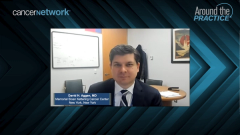
Novel Combination Strategies in the Treatment of Renal Cell Carcinoma
Before closing out their discussion on intermediate-risk RCC, experts review frontline triplet combinations and possible treatment options following relapse after nivolumab-ipilimumab.
Episodes in this series

Transcript:
Robert J. Motzer, MD: Two last questions. There’s an interest, David, in following these combinations with triplet therapy. I know that there are 2 big phase 3 trials addressing triplet therapy. Can you briefly review these trials and let us know your level of excitement about these studies?
David H. Aggen, MD: Sure. For the right patient with intermediate porous disease, it makes a lot of sense to pursue a triplet therapy up front if you can mitigate the toxicities. There are probably differences in how immunogenic TKIs [tyrosine kinase inhibitors] are based on the dosing. The success of these trials will depend on whether patients can stay on the TKI with a combination immunotherapy regimen.
One trial we’re all looking forward to reading out is COSMIC-313, evaluating ipilimumab-nivolumab with and without cabozantinib. The concern with nivolumab-cabozantinib is that the grade 3 AE [adverse event] rate is on the order of 70%. It will be interesting to see what that looks like with a triplet regimen.
The other phase 3 trial that will be accruing, or is already accruing, is a combination based on pembrolizumab-lenvatinib, either pembrolizumab-lenvatinib with or without the HIF2-alpha inhibitor belzutifan or the Merck CTLA4 inhibitor quavonlimab. The 1 worry with looking at HIF2-alpha plus pembrolizumab-lenvatinib is that we might run into more issues with hypoxia and lung toxicities. It will be interesting to see how that’s tolerated. We’re at the infancy in understanding how belzutifan affects the tumor microenvironment, but there’s a lot of interest in escalating early on for the right patients. We’re going to learn a lot about how to mitigate these toxicities as we start to treat patients with triplets up front.
Robert J. Motzer, MD: Thanks very much. Before we move on to the last case, I have 1 last question for Mehmet. For patients who progress on ipilimumab-nivolumab, what’s your go-to regimen in the second line?
Mehmet A. Bilen, MD: Thank you so much, Bob. My default second-line agent is cabozantinib unless I have a clinical trial. There are a number of clinical trials enrolling in that patient population for different I/O [immuno-oncology]–TKI combinations and TKI-HIF combinations. Hopefully, we’ll have more options in the near future. But if there’s no clinical trial, I prefer cabozantinib as a single agent. If I have oligoprogression, sometimes I add it on top of nivolumab based on the first-line data. Sometimes I want to get synergistic effect. After cabozantinib, I tend to use everolimus as a third line and maybe tivozanib-axitinib as a subsequent-line therapy. But it’s mainly VEGF driven in the a second line and beyond at this point.
Robert J. Motzer, MD: Thanks very much. That’s a great discussion and a really informative and interesting case.
Transcript edited for clarity.
Newsletter
Stay up to date on recent advances in the multidisciplinary approach to cancer.










































